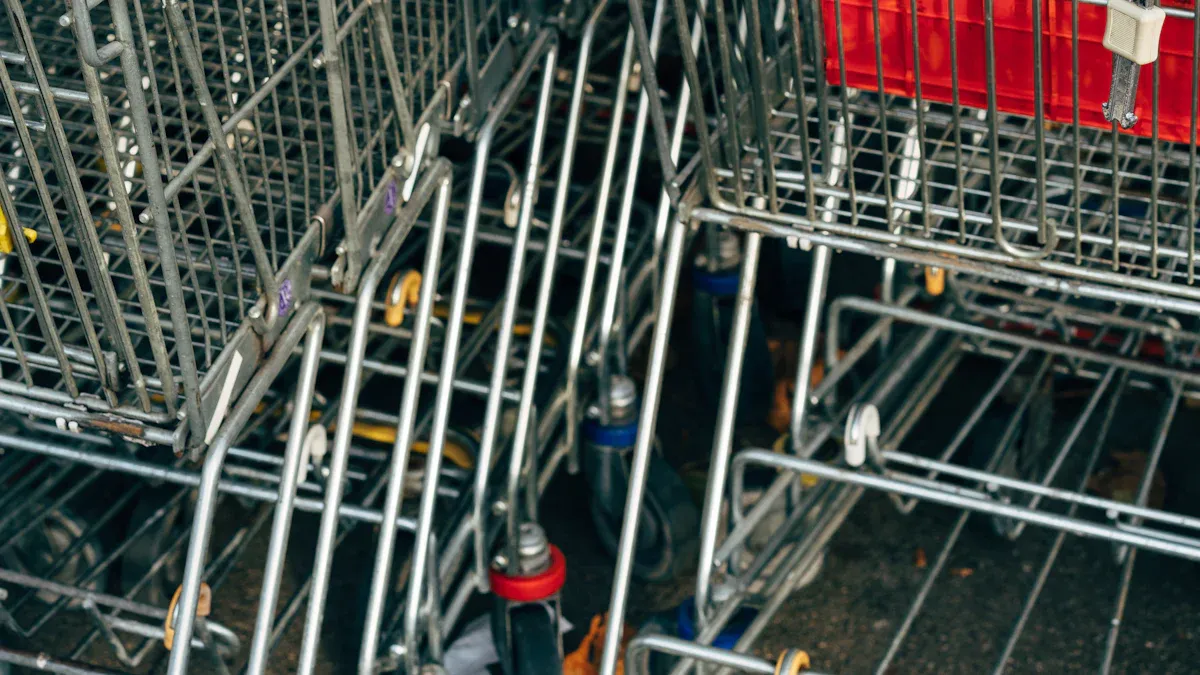Bulk Buying Power: Strategies for Group Purchases and Cost Savings in Europe

Imagine you could save money by working with others. That is the power of bulk buying power. In Europe, more people and businesses use bulk buying to get better prices. They also save more money. The Global Group Purchasing Organization Service Market will grow by USD 2.05 billion from 2024 to 2028. This means bulk buying is not just popular; it is a smart way to work better and save more. When you utilize bulk buying power, you get more than just lower prices. You can choose from a wider range of products. You also benefit from easier ways to access what you purchase. Digital platforms and cross-border services help make bulk buying simple for everyone. This approach works whether you are shopping for your family or running a business.
Key Takeaways
Bulk buying power helps groups save money. Groups get volume discounts that one person cannot get.
Talking with suppliers can help you get better deals. You might get lower prices, free shipping, or easier ways to pay.
Digital platforms make bulk buying simple. They help you compare prices and keep track of orders.
Good inventory management is very important. It stops storage problems and keeps bulk buying from causing waste.
Having good relationships with suppliers makes your group stronger. This can help you get better deals and services.
Group Purchasing and Cost Savings
How Group Buying Reduces Costs
You want to save money, right? Bulk purchasing gives you a smart way to do that. When you join a group for bulk buying, you can unlock volume discounts that are not available to single buyers. Sellers love big orders. They often offer better prices when you buy more. You get lower prices per item, and your group enjoys more cost savings.
Let’s look at how this works. Imagine you and your friends want to buy new phones. If you each buy one, you pay the regular price. If you buy ten together, the seller may give you a special deal. That’s a volume discount. You can use this strategy for many products, from groceries to electronics. Bulk purchasing helps you stretch your budget and get more for less.
Here’s a quick table to show how group buying can change the price:
Number of Items | Price per Item | Total Cost | Savings per Item |
|---|---|---|---|
1 | $100 | $100 | $0 |
10 | $85 | $850 | $15 |
50 | $75 | €3750 | $25 |
You see the difference. The more you buy, the bigger the savings. You can use these strategies with family, friends, or even coworkers. Bulk purchasing is not just for big companies. Anyone can use it.
Negotiation Leverage and Supplier Terms
When you buy in bulk, you get negotiation leverage. Sellers want your big order. You can ask for better terms. Maybe you want faster shipping or extra services. You have the power to negotiate because your order matters to the supplier.
Here are some strategies you can use:
Ask for volume discounts.
Request flexible payment options.
Negotiate for free shipping.
Seek better return policies.
Tip: Always compare suppliers before you decide. You can use digital platforms to check prices and terms. This helps you find the best deal and maximize your savings.
Bulk purchasing gives you more control. You can shape the deal to fit your needs. Use these strategies to get the most out of every group purchase.
Understanding Bulk Buying Power
Key Concepts and Definitions
Let’s talk about what bulk buying power means. When you join a buying group, you work with others. Together, you ask suppliers for better deals. You use your group’s orders to get lower prices. This is called collective purchasing power. Suppliers like big orders. They often give discounts and special offers to groups.
Here’s what happens with group purchasing:
You and others put your orders together to make one big order.
You can get deals that single buyers usually cannot get.
You might get better payment terms or extra services.
Your group saves money and gets more value, so you can compete better.
Note: Buying groups can get deals that even some wholesalers cannot get. That is why working together is so powerful.
Group Purchasing Models in Europe
There are different ways to do group buying in Europe. Each way gives you a different amount of control and choice. Here are the main types:
Model Type | Description |
|---|---|
Centralized | One main team makes all the buying choices for the group. |
Decentralized | Local teams or members choose what and when to buy. |
Hybrid | Some choices are made by a main team, and others by local teams. |
Some groups use a centralized model. This means one office does all the buying. Other groups use a decentralized model. In this model, each member can choose what to buy. The hybrid model mixes both ways, so you get both benefits.
You will also see different kinds of cooperative purchasing. These depend on how much say each member has and what the group does together. No matter which model you pick, the goal is the same. Use your group’s power to get the best deals you can.
Benefits of Bulk Purchasing
Lower Unit Prices and Economies of Scale
When you buy with a group, you save money. Suppliers like big orders. They often give special deals and lower prices per item. You get more for your money. Your group can get special offers that others do not get.
Check out this table to see how buying in bulk helps you:
Benefit | Description |
|---|---|
Cost Savings | Buying more lets you ask for better prices. |
The more you buy, the less each item costs. | |
Reduced Shipping Costs | Putting orders together can make shipping cheaper. |
You may see that suppliers give discounts for big orders. These savings help your group have more money. Bulk buying also lets you get special deals that single buyers miss.
Here is what happens when you buy in bulk:
You get special promotions.
You pay less for each item.
You can ask for more deals.
You save on shipping by ordering together.
When you buy more, your fixed costs are spread out. This means you pay less for each thing. Your group can use the extra money to buy more or spend it on other things.
Streamlined Operations and Supply Chain
Bulk buying does more than lower prices. It makes your supply chain easier. When you work with others, you can plan orders together. You can share what you buy. This teamwork makes supply chain management better and less stressful.
Studies show that working together and sharing what you buy helps your group work better. You can plan orders, spend less on finding products, and make more money. Even big companies like BMW and Daimler use these ideas to do well.
With bulk buying, you can:
Plan your orders better.
Spend less time finding products.
Get more special deals.
Make your supply chain work better.
You get a smoother process from start to finish. Bulk buying helps you stay organized, save money, and get the best deals every time.
Challenges in Bulk Buying
Storage and Inventory Issues
Bulk buying sounds great, but you might run into some bumps along the way. One big challenge is storage. When you buy a lot at once, you need space to keep everything safe and organized. If you do not plan well, you can end up with boxes everywhere and no idea where anything is. Sometimes, you might even lose track of what you have.
Here are some common storage and inventory problems that group buyers in Europe face:
Challenge | Description |
|---|---|
Stock management | Hard to keep track of how much you have. Items get lost or forgotten. |
Inventory waste and defects | Mistakes or poor training can lead to damaged or wasted products. |
Inefficient processes | Manual tracking can cause errors and missing items. |
Tracking obsolete materials | Old or outdated items take up space and waste money. |
Incorrectly located items | Poor systems make it tough to find what you need, causing delays and frustration. |
Tip: You can use digital tools to help track your stock and avoid these headaches. Even a simple spreadsheet can make a big difference.
Capital and Supplier Risks
You also need to think about money and your suppliers. Bulk buying often means you spend a lot up front. If you guess wrong about how much you need, you might end up with too much stock. That can cost you extra for storage and leave you with things you cannot sell.
Let’s look at some of the main risks:
Risk Type | Description |
|---|---|
Buying too much can lead to extra costs and wasted products if you do not sell everything. | |
Supplier Dependency | Relying on one supplier can be risky if they have problems or raise prices. |
Price Volatility | Prices can change quickly. If the market shifts, your savings might disappear. |
Note: Always check your supplier’s reputation and try to spread your orders across more than one source. This helps protect you from surprises.
Bulk buying can save you money, but you need to watch out for these challenges. With good planning and smart tools, you can avoid most problems and make your group purchase a success.
Bulk Purchasing Strategies for Success
If you want to do well with bulk purchasing, you need good strategies. These steps help you save money and avoid problems. They also help your group work better together. Let’s look at what you should do to succeed.
Market Research and Price Comparison
Start by doing research. You need to find the best deals. In Europe, many stores sell the same things. People often compare prices to save money. Price comparison tools make this easy. You can check prices from different sellers quickly. This helps your group always find the lowest price.
Use online price comparison engines to see which store has the best deal.
Read reviews and ratings to make sure the seller is good.
Check for hidden fees or shipping costs before you buy.
Try digital platforms like Fishgoo for b2b sourcing. You can paste product links, compare options, and see everything in your language.
When you compare prices, you make better choices. Your group can buy more and spend less. This is one of the most important bulk purchasing strategies.
Building Supplier Relationships
You need strong supplier relationships for bulk purchasing to work well. Good suppliers give you better prices and faster shipping. They may also offer special deals. Building these relationships takes time, but it is worth it.
Here are some best practices for supplier relationships:
Best Practice | Description |
|---|---|
Set strategic objectives and establish KPIs | Make sure your goals match your business needs. Track how well suppliers do. |
Use a centralized supplier management system | Keep all supplier info in one place. This saves time and avoids mistakes. |
Make sure your supplier management matches your group’s goals. This helps you reach your targets faster.
Pick suppliers who know about b2b needs and can handle big orders.
Set clear agreements so everyone knows what to expect.
Talk to your suppliers often. Share feedback and fix problems together.
Make backup plans in case something goes wrong.
When you focus on strong supplier relationships, you build trust. Your group gets better service and fewer surprises. This is important for b2b teamwork and long-term success.
Demand Forecasting and Planning
Guessing how much to buy can cause waste or shortages. Demand forecasting helps you plan better. You look at past orders, market trends, and what your group needs. This way, you only buy what you need.
Forecasting helps you balance supply and demand. You avoid buying too much or too little.
You can order on time and skip last-minute rushes.
Good planning helps logistics companies adjust to busy or slow times.
When you share your plans with suppliers, they trust you more. This reduces delays and builds strong supplier relationships.
Use digital tools or spreadsheets to track what your group needs. Talk to your team and suppliers often. This keeps everyone on the same page. With good planning, your bulk purchasing strategies work better.
Inventory and Logistics Management
After you buy in bulk, you need to manage your stock and shipping. Poor management can lead to lost items or extra costs. Smart inventory and logistics keep your group organized.
Use digital tools to track what you have and where it is.
Store items safely to avoid damage or loss.
Plan your shipping. Combine orders to save on delivery costs.
Try cross-border services like Fishgoo. They help with b2b sourcing, parcel consolidation, and international shipping. You can track your orders, get quality checks, and choose the best shipping route.
Working together is important here. Decide with your group when and how to ship. Share updates so everyone knows what’s happening. This teamwork makes bulk purchasing smooth and efficient.
Tip: Technology makes group coordination easier. Use apps or online platforms to chat, share updates, and manage orders together.
When you follow these bulk purchasing strategies, your group is set up for success. You save money, avoid problems, and build strong supplier relationships. With good planning and teamwork, bulk purchasing can work for any group—big or small.
Cross-Border Group Buying and Logistics

International Sourcing Platforms
Buying things from other countries can seem hard. Digital platforms make it much easier for you and your group. These platforms help buyers and sellers from many countries connect. You can look for good deals without leaving your house. They let you see what is for sale, check prices, and talk to suppliers.
Here are some ways digital platforms help with cross-border group buying:
They link many markets, so you can find products worldwide.
You learn what other buyers and sellers are doing.
You can make smart choices without traveling anywhere.
Let’s look at two well-known international sourcing platforms:
Platform | Features | Advantages |
|---|---|---|
Europages | Multi-language interface | Perfect for sourcing within EU countries under strict regulations |
Kompass | Advanced company filtering (size, revenue, location) | Bridges procurement with strategic growth |
Platforms like Europages and Kompass let you reach millions of suppliers. You can search by country, product, or company size. This helps your group find just what it needs.
Parcel Consolidation and Shipping Solutions
Buying from different sellers can make shipping tricky. Parcel consolidation helps solve this problem. Services like Fishgoo collect your group’s orders in one warehouse. They check the quality, put everything together, and send it to you.
Here’s how parcel consolidation and shipping solutions help you:
You pay less for shipping because all your items go together. This means your group saves money on shipping.
You get one big package instead of many small ones. This makes delivery easier and safer.
Customs clearance is simpler with one shipment. You save time and avoid problems.
Fishgoo also gives extra services. You can pick special packaging, insurance, or storage. You can pay with PayPal, credit cards, or other local ways. Their warehouse keeps your things safe until you want them shipped.
Tip: Using a cross-border service helps you feel calm. You get quality checks, easy payments, and quick delivery—all in one place.
Real-World Applications in Europe
Retail and Wholesale Buying Groups
You may wonder how bulk purchasing works in real life. In Europe, many stores and wholesalers use this idea to save money. When people join together, they can buy more and pay less. Here are some groups that use bulk purchasing:
European Marketing Distribution (EMD) brings 20 retailers from different places together.
Superunie works in the Benelux area and is part of EMD.
Euromadi helps big sellers in Iberia.
RTG has local stores like Netto Nord and Globus Handelshof.
Eurelec is a team made by Ahold Delhaize, Rewe, and Leclerc.
Intermarché, Auchan, and Casino joined to make France’s top central buying group.
Epic Partners and Everest also work in Europe.
Carrefour’s Eureca platform links 20 suppliers for smarter buying.
These groups use bulk purchasing to get better prices and special deals. They also make their supply chains work better. You can see that working together helps everyone get more value.
Tip: If you have a store or business, joining a buying group can help you get products for less money and make more profit.
Healthcare and Education Sectors
Bulk purchasing is not just for stores. Hospitals and schools in Europe use it too. This helps them save money and manage what they need. Here are some important facts:
Findings | Description |
|---|---|
Correlation of Allocative Activity | Buying in a decentralized way and using money rewards gives better results. |
Quality Measures Relation | No link was found between moving money and quality in the Netherlands. |
Market Power of Purchasers | Having more buyers together does not always mean money is used better. |
Recommendations for Governments | Just making things more competitive is not enough. Better rules and watching are needed. |
When hospitals or schools use bulk purchasing, they can do more with their money. They often work together to buy supplies or equipment. This teamwork helps them get what they need for less.
Note: Bulk purchasing can help your group save money, but you should also plan and check your results to do your best.
Best Practices for Bulk Buying Power
Clear Group Agreements
You want your group to work well together. Clear bulk purchasing agreements help everyone know what to expect. When you set up these agreements, you avoid confusion and keep things fair. Good agreements make your bulk purchasing strategies stronger.
Here’s a table showing what you should include in your group’s agreement:
Key Element | Description |
|---|---|
Clarity in objectives | Set clear goals for your group. |
Rights and duties | List what each member can do and must do. |
Expectations | Explain how members should support group strategies. |
Provisions for data handling | Say how you will use and protect group data. |
Fees and dues | Show what each member pays to join or stay. |
Liability and indemnification | Protect your group from certain risks. |
Membership criteria | Set rules for who can join and stay. |
Termination grounds | List reasons someone might leave the group. |
Confidentiality | Keep group information private. |
Non-assignability | Make sure no one can give their spot to someone else without approval. |
When you use these elements, your bulk purchasing agreements become a strong foundation. Everyone knows their role. Your group can focus on the best strategies for success.
Technology and Continuous Improvement
You can use technology to make your bulk purchasing strategies even better. Digital tools help you track orders, compare prices, and talk with your group. You can spot problems early and fix them fast.
Many companies use technology to pick the best suppliers and watch their performance.
You can use apps to check if suppliers meet your group’s standards.
Some groups ask suppliers to solve problems quickly and keep improving.
You can use risk checks and audits to make sure your group’s strategies work well.
Tip: Try new tools and review your strategies often. This helps your group stay ahead and get the most from bulk purchasing.
When you mix clear agreements with smart technology, your group can use the best strategies. You save money, avoid mistakes, and keep getting better at bulk purchasing.
You can unlock real cost savings by using a smart wholesale purchasing strategy. Check out these top strategies:
Strategy | What It Means |
|---|---|
Optimizing order quantity | Buy the right amount to avoid waste and boost savings. |
Leveraging discounts and promotions | Use supplier deals to lower costs. |
Efficient inventory management | Track your stock in real time. |
Total cost of ownership | Think about all costs, not just price. |
Diversifying supplier base | Build strong collaboration and partnerships for steady supply. |
Ready to start?
Assess your needs and goals.
Choose a digital platform that fits your business-to-business needs.
Join a buying group or try Fishgoo to see how easy group purchasing can be.
You will see more savings, a smoother process, and a wider range of products. Take the first step and let bulk buying power work for you!
FAQ
How do I start a group purchase in Europe?
You can join an existing buying group or create your own. Find people with similar needs. Use digital platforms like Fishgoo to organize orders, compare prices, and manage payments. It’s easy to get started and save money together.
What is parcel consolidation, and why should I use it?
Parcel consolidation means combining several orders into one shipment. You save on shipping costs and get all your items at once. Services like Fishgoo handle this for you, making international group buying much simpler.
Can I buy from Chinese platforms if I don’t speak Chinese?
Yes! Platforms like Fishgoo let you paste product links and see everything in English. You don’t need to read Chinese or set up local payment accounts. The process is simple and user-friendly.
How do I make sure my group gets the best deal?
Always compare prices from different suppliers. Use online tools and read reviews. Negotiate for discounts and better terms. Digital platforms help you track deals and make smart choices for your group.
What payment methods can I use for cross-border group buying?
You have many options. Most platforms accept PayPal, credit cards, and local payment methods. Fishgoo supports global payments, so you can pay in the way that works best for you.
See Also
Navigating Weidian: A Shopper's Guide to Chinese Goods
Enhancing Your International E-Commerce Logistics for Success
Top Proxy Shopping Platforms for International Shoppers


